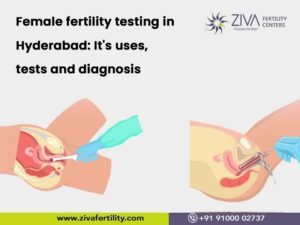Azoospermia is a condition of male infertility where there is no sperm in a person’s ejaculate. The main factors for this condition are blockage along the reproductive tract, hormonal problems, ejaculation problems or issues with testicular structure or functionality. However, the good news is that most of the underlying conditions are treatable. In most cases, live sperm is retrieved with special techniques which can be used in assisted reproductive techniques like IVF. About 10% of male infertility cases are due to Azoospermia.
Understanding Azoospermia

As mentioned above, males suffering from Azoospermia have no measurable sperm in their ejaculate. In males, the testes are sperm-producing glands. After travelling through the reproductive system, the sperm mixes with fluids to form semen. During ejaculation, semen is the fluid that your penis releases. In males with Azoospermia, they may have semen, but there will be no sperm in it. Simply Azoospermia is referred to as having “no sperm count.”
Some men have Azoospermia as a genetic condition, while some develop it as a teenager or adult. Azoospermia is treatable with medication and surgery in certain situations. But definitely, it is not the end of the road if you want to have biological children, so definitely visit an expert fertility centre like ZIVA Fertility Centre.
There are varying degrees of Azoospermia and, hence, divided into three categories:
Post-testicular Azoospermia: In this condition, there’s a blockage or missing connection along your reproductive tract. So there is sperm production, but it’s getting blocked from exiting for whatever reason. Another name for this type is obstructive Azoospermia, and it affects up to 40% of males with Azoospermia.
Testicular Azoospermia: In this condition, one has poor or no sperm production due to a structural or functional disorder in the testicles. Medically, this is sometimes called nonobstructive Azoospermia.
Pretesticular Azoospermia: In this condition, the testicles and reproductive tract appear normal, but there is no hormonal stimulation to make sperm. Most males who undergo chemotherapy or have hormonal imbalances go through this type of Azoospermia. This also comes under the category of nonobstructive Azoospermia.
Symptoms and causes of Azoospermia
Most men realise this condition only while trying to conceive a child with their partner without success. Look out for low libido due to hormonal imbalance or a lump on your testicles from an infection. The most common causes of Azoospermia are an obstruction or blockage or genetics and hormone imbalances.
Treatment options for Azoospermia
Diagnosis of Azoospermia
After a semen analysis in the lab, if there is no sperm, then it means that the patient has Azoospermia. A fertility specialist orders a sperm analysis, usually after the couple is trying to get pregnant without success.
Apart from the semen analysis, a fertility specialist may also order the following tests:
- Blood tests in which the testosterone and follicle-stimulating hormone levels are measured.
- X-rays or ultrasound of your scrotum.
- In rare cases, a brain MRI is done to check if the hypothalamus or pituitary glands are causing Azoospermia.
Along with the tests, below are some of the data points collected by the fertility specialist:
- The entire medical history, mainly focussed on fertility
- Injuries or surgeries to the reproductive or pelvic area.
- Infections like urinary tract infections or sexually transmitted infections.
- Medications are currently being used or have been used in the past.
- Patterns of alcohol, smoking, marijuana or drug use.
- Is the patient getting constantly exposed to the use of saunas or working with their laptop closer to the scrotum?
- Genetic history of birth disorders, cystic fibrosis or infertility.
- Work environment, especially if they are exposed to hazardous, poisonous, or radioactive materials.
- A thorough physical examination, paying close attention to the areas of your scrotum and rectum.
Management and Treatment of Azoospermia

The treatment is highly dependent on the cause. The treatment options are:
- Surgery helps to unblock tubes and ducts or reconstruct and connect ones that aren’t allowing sperm to flow through. This works when a blockage is the cause of your Azoospermia. Surgery to fix the blockage may result in having sperm in your semen.
- Prescription hormone treatments, when hormonal balances are the leading cause.
- With a needle retrieving sperm directly from your testicle. The extracted sperm can help you achieve a pregnancy using assisted reproductive technology like in vitro fertilisation (IVF) or intracytoplasmic sperm injection (ICSI).
- Genetic counselling, if the cause of Azoospermia is thought to be something that could be passed on to children.
- Stay away from activities that could injure your reproductive organs or wear protection.
- Save yourself from radiation exposure when possible.
- Before using any medication, know the risks that could harm sperm production.
- Do not expose your testes to hot temperatures.
- If none of the above work one can always use a donor sperm of course after discussing with your partner.
- Please know that in males with hormonal problems and obstructive causes, Azoospermia is usually treatable, and fertility can potentially be restored. Even if these methods fail, it’s still possible to retrieve live sperm to be used in assisted reproductive techniques like IVF.
Handling non-medical aspects of azoospermia treatment
We at ZIVA Fertility Clinics understand that azoospermia diagnosis can have physical and emotional side effects. So please rely on the fertility specialist’s expertise and lean on your partner while you navigate the best treatment. Also, seek counselling apart from medical care. The patient has to be both mentally and emotionally stable to handle the treatments and for a healthy recovery. Please include your partner, family or friends in this journey and know that It’s normal to feel upset about a setback like this. Never let hopelessness set in, and many men went on to have biological children.
Genetic testing and counselling are also included in treating Azoospermia. Once you and your partner are unsuccessful at getting pregnant after 12 months of regular, unprotected intercourse, please consult a fertility specialist. Please have an honest discussion with your provider about your concerns and possible treatment options. For more information, please visit our website https://zivafertility.com/ or contact us at +91-9100002737 or +91-9392834024.
















